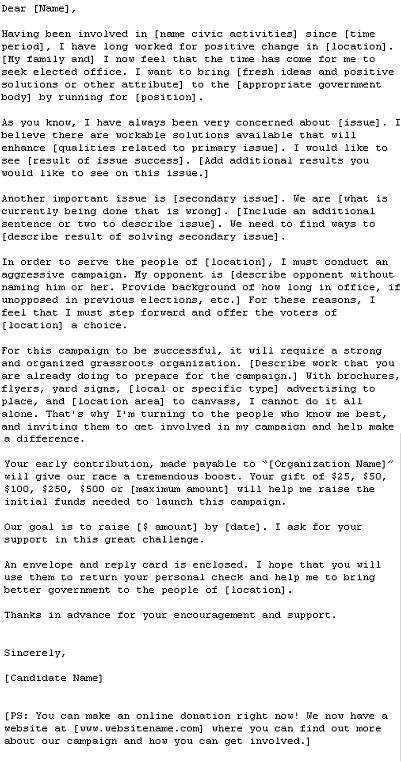Online Marketing With a Limited Campaign Budget
While budgeting for signs and mailers, how much of your campaign spending will go toward online marketing? While social media through Facebook and Twitter may be ‘free’, you may want to boost your online exposure with paid online advertising. Below are a few popular and low-cost marketing ideas suitable for local political campaigns.
Advertising your campaign is generally done for branding purposes, though advertising can also be used for informational purposes and even as a fundraising tool. For branding, it’s all about exposure and getting your message to as many people in as many places as possible.
Your best bet for Pay Per Click advertising is Google Ads. PPC ads are based on targeting particular keyword searches on Google. If you decide to use PPC advertising, you will want to target a specific audience and keep an eye on your costs. It’s easy to spend money on irrelevant searches, so you will want to primarily target phrases and exact terms in your ad campaign. As you discover unrelated terms that attract clicks, you should add them to your list of negative terms.
Larger political campaigns often advertise on more than just the search engines. They may also allow their ads to appear on the Google Display Network which would place the ads across potentially thousands of websites. You’ll need to be authorized before your campaign can advertise on Google.
Have you produced campaign videos? Paid search on YouTube is called promoted video ads. It’s similar in concept to Google Ads. You select a video to promote, write promotional text, and choose which keywords should trigger your ad. Your video promotion (a thumbnail of your video with your text) will appear next to contextually relevant search results.
Marketing on Facebook can be very effective. Instead of targeting based on keywords, Facebook allows advertisers to target people based on their demographics. This means you can drive your message directly to voting-age users that match specific locations and have expressed a preference in particular interests. The minimum required daily budget is a dollar, so the barrier to entry is low.
Before you start advertising with Facebook, make sure that you are authorized to do so.
Banner ads are still relevant, especially when run on local media sites, such as local newspaper websites. Banners can help with branding and messaging efforts regardless of how much they are clicked. While traditional banner ads often have click-through rates of less than one-half of one percent, banner ads often perform much better when they appear on a local outlet, such as a newspaper website. The cost for banner ads varies with the market and the outlet.
How much should you budget? This varies on the size of the campaign and the extent of the advertising. It’s better to commit a small budget early on to see what works and what does not. If you use advertising as a way to promote online fundraising, it should be able to pay for itself and then some. Tracking your advertising success becomes critical in this case, so you aren’t spending more money than your campaign is raising.
Get Running for Office as an Online Candidate, our exclusive book that is packed with tips and strategies to develop and promote local political campaigns.
Text Messaging for Political Campaigns
 With the rise of cell phone usage, political campaigns are using mobile texting as an effective campaign tool. As mobile computing blurs the line between online and offline campaigning, we are going to see more use of crossover technologies by political campaigns. Candidates will have the ability to reach out to voters and supporters faster and easier than ever before.
With the rise of cell phone usage, political campaigns are using mobile texting as an effective campaign tool. As mobile computing blurs the line between online and offline campaigning, we are going to see more use of crossover technologies by political campaigns. Candidates will have the ability to reach out to voters and supporters faster and easier than ever before.
One great advantage to text messaging is that it has a high delivery rate – even better than RSS. Recipients must opt-in to receive texts, and a vast majority of the sent text messages are actually read. Services such as Political Comms specifically cater to political campaign text messaging. Advocacy groups and nonprofits can also benefit from having a mobile strategy.
The process for creating a mobile messaging program is fairly simple. Once you create an account with a short message service (SMS), you will be able to pick a Keyword for your campaign. People then opt-in to your messaging list by texting that Keyword to a particular number. (Ex: Text SMITH4GOV to 555432) A campaign can then send text message alerts through the SMS to all subscribers on the list.
Text messaging can help your campaign in a number of ways:
- Quickly update supporters on key issues.
- Organize rallies.
- Broadcast volunteer opportunities.
- Inform supporters about fundraising events.
- Notify voters and constituents about legislative happenings.
- Get Out The Vote: Remind people to vote on Election Day.
An early study showed that political text message reminders increased a new voter’s likelihood of voting by 3 percentage points. That difference in voter participation can mean the difference between an election victory or loss.
Text messaging and SMS is not just for candidates with deep pockets. Mobile texting services can be started with a small budget as little as $20/month. Promoting your campaign text alerts can be done both online and offline. Widgets can be created to allow supporters to sign up directly through your campaign website or Facebook page. With a little work, you can start early and build up a large list of people who can be instantly alerted to new campaign announcements and messages.
Free Download [PDF]: Political Campaign Website Meets Text Messaging
Raising Political Donations Online
Running a successful political campaign costs money. A candidate needs to raise funds throughout the entire campaign. Over the last decade, the web has become a popular and powerful tool for political fundraising. As technical barriers have dropped, more and more local campaigns are raising money online.
Putting together the right resources at the start will make your online fund-raising process more successful. As technical barriers have dropped in recent years, more and more local campaigns are successfully raising money online.
Of course, the most effective way for local campaigns to raise money is still the “old-fashioned” way—by making calls and holding events. Personal contacts and solicitation are still integral parts of the fundraising process.
A short aside…
About 20 years ago (before we started Online Candidate), we were working on a local campaign. We offered to set up a PayPal donation system for the candidate. She refused, basically on the grounds that it didn’t make sense to have another service take a “cut” of the donations through transaction fees. Checks would be fine, thank you.
Of course, we informed her that she would probably miss out on potential donations if there was not an online fundraising system in place.
It didn’t happen. The candidate lost, but it wasn’t because of a lack of funds.
The internet can and should be a major component of your fundraising efforts. Here are the basic steps for raising political donations online:
Create a campaign website to accept contributions
A campaign website is the hub of a candidate‘s online presence. Your site should be created as early as possible. It should contain plenty of information about the candidate, the campaign, and the issues. Your site should be an inviting place where voters can visit often for campaign news and updates.
Set up an online fundraising processor
There are a number of services that allow campaigns to do online fundraising. They typically charge transaction fees (typically between 3 and 8%) that are deducted from the top of any payment. Most services do not charge setup or recurring fees. Political donation processors are the best method for taking payments online. Some vendors offer different features, such as taking donations through social media accounts and running different fundraising campaigns at the same time.
Related Reading: Comparing Political Donation Platforms—Our Recommendations
Build a donor prospect list and work it
A crucial step to online fundraising is your prospect list. You may have access to some contacts through your local political party. Create a sign-up form for visitors to subscribe to campaign updates and alerts. You can get email addresses offline by asking for them at events. Your campaign should have a solid privacy policy that promises to keep subscriber and donor information private. Many political campaigns today turn to data segmenting to better target fundraising and issue messaging.
Pull it together and get to work
Once you have a website, prospects, and a payment processor in place, the real work begins.
Add a “Donate Now” link and/or button to your website. Be sure that it appears on every page, as you never know on what page a visitor might arrive at your site.
You should include your website URL in all your email updates, your social media profiles, and all of your direct mail pieces and signage.
Send regular updates to your email list and social media subscribers. Your interactions should not only be solicitations for donations. More often than not, your updates should be of an informative nature. By engaging supporters, you are getting people to know, like, and trust you.
As a connection is built with your campaign, individuals will be more likely to donate money, invest time, help spread the word, and, ultimately, vote for you.
Regardless of how you raise money, your campaign is responsible for complying with the law. Check your local laws and seek legal advice if necessary. Good luck!
Any political payment processor can be used with the Online Candidate website system.
Book Review – The Campaign Manager by Catherine Shaw
 Our first book review is The Campaign Manager: Running and Winning Local Elections. In this book, author Catherine Shaw draws on experience from her three terms as mayor of Ashland, Oregon, and dozens of campaigns to provide practical, proven advice. Her field-tested methods carry candidates through the entire process.
Our first book review is The Campaign Manager: Running and Winning Local Elections. In this book, author Catherine Shaw draws on experience from her three terms as mayor of Ashland, Oregon, and dozens of campaigns to provide practical, proven advice. Her field-tested methods carry candidates through the entire process.
In this fourth updated edition, the entire campaign process is laid out for the reader – from putting together a campaign team to fund-raising, targeting voters, evaluating media effectiveness, to GOTV efforts and everything in between. Issue-based campaigns and ballot measures are also covered. The topics are supplemented with anecdotes about the author’s own campaigns and campaigns she has worked with. The appendix includes information on conducting a precinct analysis, predicting voter turnout and more.
It’s a dense book, and one that should be read well in advance of any campaign.
The Campaign Manager provides an excellent blueprint for offline campaigning. It covers every step of the process in organizing and running a US political or grassroots issue campaign. Each topic is examined in detail and packed with valuable insight and useful suggestions. The political quotes sprinkled throughout are also fun. The book is geared toward campaigns that have (or plan to acquire) some money and resources, as it delves into direct voter targeting strategies and media buys – both of which can cost significant money.
While The Campaign Manager does a terrific job of laying out the nuances of organizing a campaign, it’s coverage of online campaigning falls a little short. Even though this is the 2010, 4th edition, the book provides only a cursory mention of campaign websites and other online opportunities and strategies. Despite these omissions, it’s still a must-read for anyone considering a run for local, county or state office. It makes a fine library addition for even experienced candidates and campaign managers.
Recommended!
Order The Campaign Manager: Running and Winning Local Elections through Amazon.com.
3 Dirty Tricks Political Candidates Pull Online
 Here are three tactics that candidates sometimes to gain an online advantage over an opponent. These are three of favorite dirty tricks, but only one of these is really ‘dirty’, though. Guess which one!
Here are three tactics that candidates sometimes to gain an online advantage over an opponent. These are three of favorite dirty tricks, but only one of these is really ‘dirty’, though. Guess which one!
Stealing a domain name. This can be painful if your opponent registers your name as a domain name. You can try to get the name for yourself, but that can take time and become an unnecessary distraction. If an opponent registers a domain of your name, does nothing with it and does not send the traffic to another site, you might want to move on and register a different name.
Back linking bad things about a political opponent. This really isn’t a ‘dirty trick’, and it’s a strategy that any party can implement. Basically, you take a bad or embarrassing article about an opponent and link to it from multiple sources. This works better on smaller campaigns with less overall online exposure. Done properly, you may be able to ‘push’ up that item in the search results for people searching for that person. One tip – use the candidate’s name as the text of the link!
Micro sites. This is where a campaign sets up a small website that focuses on a single issue or a flaw of an opponent. These sites are typically negative by nature. By targeting a more specific audience, you can provide with a single point of reference. One advantage of this technique is that you can keep ‘negative’ material off of your main campaign site. (Online Candidate websites can be used for this purpose.)
There are, of course, much nastier things being done online between political opponents. We don’t advocate stealing domain names, but back-linking and building micro-sites are effective tactics – particularly if they are backed by facts and the truth.
Sign up below for more political campaign tips and ideas.
Fundraising Letter Templates For Success
 Campaign fundraising letter templates are a great tool to help craft an effective appeals for funding and donations. But as a tool, letter templates do have limits. For a campaign to truly succeed in raising funds and cash, your fundraising letters need to written with care.
Campaign fundraising letter templates are a great tool to help craft an effective appeals for funding and donations. But as a tool, letter templates do have limits. For a campaign to truly succeed in raising funds and cash, your fundraising letters need to written with care.
Potential donors do not want to read plain, run-of-the-mill appeal for donations. An endless rotation of form letters begging for cash will only turn off potential donors and cause them to do nothing more than keep their wallets shut.
Sample fundraising letter templates are just that – templates. Simply filling in a candidate name and dollar amount will not do the trick. It takes time to modify a template to fit the specifics of a particular candidate, campaign and donation appeal. Every voter has particular issues and needs that should be weaved into the narrative of your letter.
- Your fund raising appeals should be crafted with care. Whether you are using them as mailers or as e-mail solicitations to your supporters, there should be specific goals related to that each solicitation of money. Donation appeals – and especially your first appeal – should be genuinely crafted to appeal to readers on both a personal and emotional level. A template helps with the letter structure and provides proven phrasing to tie it all together into copy that sells.
- Add a few sentences about how and why a donor’s gift will make a difference to the campaign. There should be specific reason why that donation is critical and necessary. It might be to get a last message out to the voters before the primaries, to fund a final mailing before the election or to help get another 100 campaign signs printed to replace those that were stolen early on in the campaign.
- Let your donors know what their past donations have helped accomplish. Show them how that last mailing pushed through your success in the primaries, or how the donor last push was used to send two new brochures to the local voters. Past success inspires future support and repeat donations.
- Give your donors a set date in which to reply and donate. Time-sensitive requests often get a better response, because there is an incentive to act sooner than later. Remember to include an addressed envelope. If you can afford it, stamp it as well. Many people would rather donate a small amount than to let a stamp go to waste.
Finally, let your donors know about your campaign website and their ability to donate through your website. Many donors who won’t take the time to open a checkbook will make a quick online donation.
Below is a Sample Fundraising Letter Template for political candidates.
Used properly, donation letter templates can be useful to any local political campaign. They can inspire ideas and help structure an appeal for maximum effectiveness. With personalization and the addition specific goals, you can connect with your donor base and raise the funds needed to sustain a successful campaign.
For more fundraising letter templates, donation request letters, political press release templates and more, download our Online Candidate Political Letter Templates today.
Become an Online Candidate website client and get access to our online Campaign Letter Generator and other online tools.







